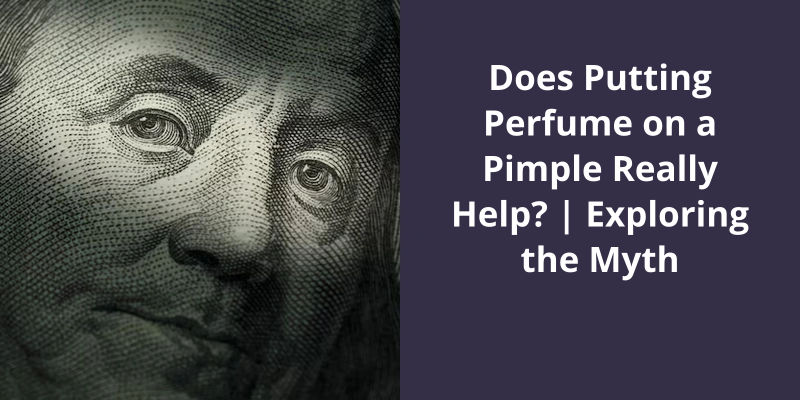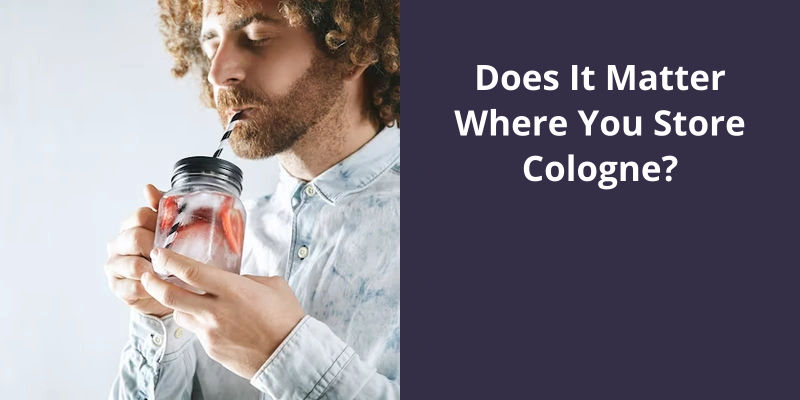Pimples are a common skin condition that can affect individuals of all ages and genders. The presence of pimples on the face can be a source of embarrassment and self-consciousness for those who suffer from them. Desperate for a quick fix, many individuals turn to unconventional remedies in an attempt to banish their blemishes. One such remedy often touted by well-meaning friends or family members is the application of perfume to pimples. However, does this advice hold any scientific merit or is it just another old wives' tale? In this article, we will explore the potential effects of putting perfume on a pimple and whether or not it’s a viable treatment option.

Can You Break Out From Perfume?
When it comes to skincare, everyone has different needs and concerns. Some people can slather any product on their face without any issue, while others are prone to breakouts at the slightest irritation. Fragrances have been a known irritant for many years, and the perfume industry is notorious for using ingredients that can cause skin sensitivities and acne breakouts.
In fact, there are many people who experience breakouts due to their perfume, even if they don’t have sensitive skin. Fragrances are made up of a complex blend of synthetic and natural ingredients, and are often formulated with alcohol and other potentially irritating substances. When applied to the skin, these ingredients can cause inflammation, redness, and even acne.
If youre prone to breakouts, it’s important to be especially careful with your perfume application. Avoid spraying it directly on areas where you frequently experience acne, such as your chin, forehead, and cheeks. Instead, focus on applying it to non-acne prone areas, such as your wrists and neck.
Of course, the best way to avoid perfume-induced breakouts altogether is to avoid using fragrance products altogether. There are plenty of unscented or fragrance-free skincare products available on the market, so it’s easy to find alternatives that won’t aggravate your skin.
At the end of the day, it’s important to pay attention to your own skin and listen to what it’s telling you. With a little bit of effort, you can find the right products to keep your skin looking healthy and clear.
Dermatologist-Recommended Skincare Routines for Those With Sensitive or Acne-Prone Skin.
This article discusses skincare routines that are recommended by dermatologists for individuals who’ve sensitive or acne-prone skin. The goal is to provide valuable information to those seeking advice on how to care for their skin without triggering breakouts or irritating their sensitive skin.
It’s clear that fragrances can be irritating and even pore-clogging, especially if you’ve sensitive skin. So what should you be looking for in a perfume if you want to avoid these skin issues?
Is Perfume Pore Clogging?
Perfumes and colognes rely on a combination of fragrances and oils to create a unique scent. However, some of these synthetic ingredients can be irritating to the skin and lead to clogged pores. These oils can mix with bacteria and dirt on the surface of the skin, causing acne breakouts and other skin irritations. Besides synthetic fragrances, essential oils can also be pore-clogging and cause skin problems.
So, if you’ve sensitive skin, it’s essential to be mindful of the types of fragrances you use in your skincare products. Avoid products that contain synthetic fragrances and opt for plant-based, natural fragrances like lavender, rose, and chamomile. Ingredients that moisturize and hydrate the skin without clogging pores are ideal to incorporate into your skincare routine.
To avoid clogged pores, it’s essential to cleanse your face regularly and use skincare products that are appropriate for your skin type. People have different skin types, so it’s important to understand what type of skin you’ve before selecting skincare products. Using lightweight, oil-free moisturizers for oily skin and gentle cleansers for dry skin can help prevent breakouts.
Your skincare routine and lifestyle choices can also contribute to the appearance of your skin. So, to avoid pore-clogging from perfumes, it’s crucial to pay attention to what you put into your body. A diet rich in fruits and vegetables, healthy fats, and water can help keep your skin looking it’s best. Also, protecting your skin from the sun, getting enough sleep, and exercising regularly can help prevent skin problems.
How to Properly Apply Fragrances to Reduce the Risk of Skin Irritation and Acne Breakouts
- Always apply fragrance to clean, dry skin.
- Avoid spraying fragrance directly onto your skin – instead, spray a cloud of fragrance and walk through it.
- Focus on spraying fragrance onto pulse points, such as the neck, wrists, and inner elbows.
- Don’t rub your wrists together after applying fragrance – this can break down the scent.
- Avoid applying fragrance to areas of your skin that are prone to irritation or acne breakouts, such as the chest, back, and shoulders.
- If you’ve sensitive skin, opt for fragrance-free products or those specifically labeled as “for sensitive skin.”
While using perfume to treat acne may not seem like the most conventional solution, it’s a technique that some people swear by. However, as with any skincare remedy, it’s important to exercise caution and make sure you aren’t putting your health at risk. In this article, we explore whether or not it’s safe to put perfume on a popped pimple, and offer some alternative tips for combating acne and promoting healthy skin.
Can I Put Perfume on a Popped Pimple?
It’s important to note that putting perfume on a popped pimple isn’t recommended by dermatologists. The alcohol content in perfume can irritate the already sensitive skin around the pimple and cause further inflammation. While it may seem like a quick fix, it can actually make the pimple worse in the long run.
If you’re looking for a way to speed up the healing process of a popped pimple, there are other steps you can take. First and foremost, make sure to keep the area clean and avoid touching it with your hands. Consider using a spot treatment with ingredients like benzoyl peroxide or salicylic acid to dry out the pimple and reduce redness.
You can also try a warm compress to help bring down swelling and improve circulation to the area. Simply soak a washcloth in warm water, wring it out, and hold it against the pimple for a few minutes. Repeat this several times a day as needed until the pimple starts to heal.
In addition to these steps, it’s important to maintain a consistent skincare routine to prevent future breakouts. This may include using a gentle cleanser, exfoliating regularly, and moisturizing with a non-comedogenic lotion. Remember to be patient – acne can take time to heal, but with the right approach, you can reduce the appearance of pimples and prevent new ones from forming.
Instead, focus on keeping the area clean, using spot treatments, and trying warm compresses to speed up the healing process.
It’s important to be mindful of how we apply our fragrances, as it turns out that spraying directly onto our skin can have some unintended consequences. Specifically, research has shown that some perfumes can age the skin and cause pigmentation in certain areas. This is due to the presence of photosensitisers in many fragrance fixatives. Let’s take a closer look at this issue and what steps we can take to avoid it.
Does Spraying Perfume Age Your Skin?
These fixatives are chemicals that can cause a reaction on the skin when they’re exposed to sunlight. When you spray perfume onto your skin, the photosensitizers can penetrate your skin and create free radicals that can damage your DNA, causing skin ageing and pigmentation.
If you want to avoid skin ageing and pigmentation caused by perfume, you can still wear your favorite scents. The best way to avoid this problem is by spraying fragrance on clothing or hair rather than directly onto your skin. However, be aware that some perfumes can still cause an allergic reaction or irritation on your scalp or clothing.
Another way to avoid skin ageing and pigmentation caused by perfume is by wearing a sunscreen with a high SPF (Sun Protection Factor). This will help to protect your skin from the suns rays, which can intensify the effect of photosensitizers. You can also try using a perfume that’s photosensitive free or fragrance-free altogether.
Source: Can Perfume Age Your Skin? | Skin Brilliance Brighton
While popping a pimple may provide temporary relief, it can leave your skin vulnerable to infections. Many people turn to Neosporin for help, but is it really effective in healing popped pimples? Let’s dive deeper into this common skincare dilemma.
Should I Put Neosporin on a Popped Pimple?
When it comes to acne, it can be tempting to pop a pimple in hopes of quicker healing. However, this action can often lead to more problems than solutions. By popping a pimple, it causes the affected area to become a micro-wound, which can lead to infection, scarring, and delayed healing time.
Wash your face gently with mild soap and warm water twice a day to prevent bacteria build-up. After cleansing, pat the area dry with a clean towel. Avoid using your fingers to dry the area, as it can add extra bacteria, which can worsen the problem. If needed, use a medical gauze pad to lightly dab the area dry.
Once the area is clean and dry, apply a small amount of antibiotic ointment like Neosporin to the affected area before going to bed. It helps to promote healing and prevent infection. However, It’s important to note that using too much Neosporin over a long period can be counterproductive. Overusing topical antibiotics can lead to antibiotic resistance and fungal infections. Therefore, It’s indispensable to use them in moderation.
During the day, allow the area to breathe as much as possible. Refraining from applying extra cosmetics, heavy creams, or ointments can help speed up healing time. Also, avoid touching the area with dirty hands. It’s highly recommended to wear clean face masks and to change them frequently.
If the pimple is painful, apply a cold compress to the affected area. The coldness will help reduce inflammation and soothe the skin. If you start to notice an increase in pus or redness, it’s best to seek medical advice from a dermatologist. They may prescribe oral or topical antibiotics, or a steroid cream to help reduce inflammation.
By keeping the area clean, using a moderate amount of antibiotic ointment, and allowing it to breathe during the day, you can ensure fast and proper healing. Remember, the key is to handle the affected area gently and with care.
DIY Remedies for Treating Pimples at Home
DIY remedies are easy homemade solutions that can be used to treat pimples at home. These remedies include using tea tree oil, honey, aloe vera, apple cider vinegar, and baking soda. They’re natural and safe alternatives to over-the-counter acne products.
Conclusion
It’s crucial to remember that our skin deserves proper care and attention based on scientific evidence and not mere hearsay. Consulting a dermatologist or following a trusted skincare routine is necessary to treat and prevent pimples effectively. So, let's prioritize our skin's health by avoiding unverified practices and embracing the ones backed by scientific research.





